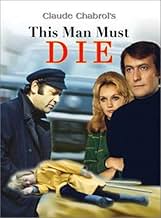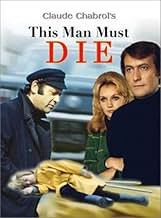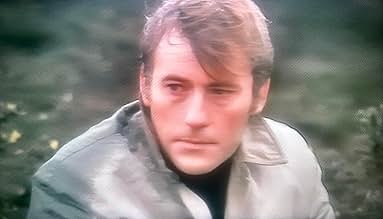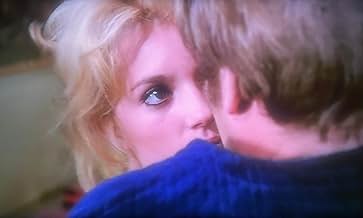IMDb RATING
7.6/10
5.3K
YOUR RATING
A man asserts himself within the life of an actress he believes is somehow responsible for his son's death.A man asserts himself within the life of an actress he believes is somehow responsible for his son's death.A man asserts himself within the life of an actress he believes is somehow responsible for his son's death.
- Director
- Writers
- Stars
- Awards
- 1 win total
- Director
- Writers
- All cast & crew
- Production, box office & more at IMDbPro
7.65.2K
1
2
3
4
5
6
7
8
9
10
Featured reviews
Claude Chabrol shows us the true meaning of death,life and revenge
If there is a Gallic director who likes to surprise his admirers with new tricks,unexpected methods and iconoclastic stance,it is new wave master Claude Chabrol.There have been many bright moments in his illustrious career when he has made films for them which could only be appreciated by a sharp brain and attentive eyes.Que la bête meure is a hard to classify film which is neither a thriller nor a run of the mill revenge drama.It is a film which plays with all leading conventions of these two genres.This man must die starts well with the depiction of a reckless accident.It is quite possible that this might induce inattentive viewers to regard it as a revenge drama.This is not the case as viewers are quickly caught in a maze of crucial dramatic scenes that have direct bearing on film's progress.Caroline Cellier and Michel Duchaussoy perform well as lovers whose relationship has a lot of bearing on this film's progress.Chabrol is known for avoiding a not so happy end for his film.This is the reason why "This man must die" will prepare you to imagine your own type of end in order to do injustice to the concept of happy end of this film.
One of the best from director Chabrol
This is a very fine psychologic thriller in some mellow tones. The story is simple : a boy gets killed by a mad car driver and his father wants to find the man to kill him. We know, from the start, that there can be two finale : the father kills the man, or he changes his mind. But Chabrol makes us think that it can have another finale... Or another? Or perhaps this one? Not at all! We never thought of the real finale. This is brillant, well written and directed movie. Very fine acting by Duchaussoy and Yanne.
a Breton revenge thriller
With 'Que la bete meure' (The English title is 'This Man Must Die' and is inspired by a novel by Cecil Day-Lewis, yes, the father of ... ) Claude Chabrol ends the decade of his consecration as one of the most talented and prolific French film directors of the second half of the 20th century. He had started the 60s as a New Wave theorist and one of the most daring directors of this current and he ends it as a well-known director and one who is very close if not part of the mainstream. Along the way, he made 15 feature films, most of them thrillers, almost all inspired in one way or another by Alfred Hitchcock's films. The master of suspense was not only an idol for the directors of the French New Wave, but he also watched them with interest and he dialogued with them, literally and even artistically. For Chabrol, 'Que la bete meure' marks not only the end of an excellent decade of film directing, but also represents one of his best and most original films.
Most of the story takes place on the Breton shores of the ocean, in the villages and especially on the roads near the cliffs. The film begins with the traumatic intersection of two destinies - a child who returns from picking shells on the ocean shore is killed by a car in a hit-and-run accident. The father, a writer of books for children (Michel Duchaussoy) vowes to dedicate the rest of his life to finding the person responsible for his son's death and murder him. He entrusts his thoughts of revenge to a personal diary that will play a key role in the story. The private investigation, with a little luck, leads the hero to identify the probable culprit quite quickly, but that the revenge plans turn out to be more complicated than expected. As in many of Chabrol's films, we come to know a French bourgeois family in which nothing corresponds to appearances, and in which the hatred of members towards the head of the family comes to resemble the situations in Agatha Christie's detective novels in which almost all characters have good reasons to commit the crime. It is a very well written script, with romantic elements, suspense and social criticism, all under the sign of revenge, and which also has the quality of an ending that does not try to solve everything but lets the viewer to choose his favorite interpretation. By the way, the dialogues are written by Chabrol, but the script is inspired by a book by Cecil Day-Lewis, yes, the father of ...
Michel Duchaussoy and Caroline Cellier do their jobs well in the role of the vengeful father and of the star actress with whom the writer begins a relationship in order to reach her brother-in-law, the main suspect. As often, however, the negative role is the one that proves to be the most interesting and JJean Yanne eclipses the two, although he enjoys less screen time. The cinematography, as always at Chabrol, is excellent. Beyond the tranquility of the landscapes or in the luxury of bourgeois houses, the dramas are hidden and the tension is ready to erupt at any moment. 51 years after the premiere, the world of 'Que la bete meure' seems much simpler, without mobile phones and the Internet, but the effect is that in their absence we get faster to the essence of the feelings and passions of the characters - and here nothing looks old-fashioned. It is one of Chabrol's most carefully designed and best-written films - recommended viewing.
Most of the story takes place on the Breton shores of the ocean, in the villages and especially on the roads near the cliffs. The film begins with the traumatic intersection of two destinies - a child who returns from picking shells on the ocean shore is killed by a car in a hit-and-run accident. The father, a writer of books for children (Michel Duchaussoy) vowes to dedicate the rest of his life to finding the person responsible for his son's death and murder him. He entrusts his thoughts of revenge to a personal diary that will play a key role in the story. The private investigation, with a little luck, leads the hero to identify the probable culprit quite quickly, but that the revenge plans turn out to be more complicated than expected. As in many of Chabrol's films, we come to know a French bourgeois family in which nothing corresponds to appearances, and in which the hatred of members towards the head of the family comes to resemble the situations in Agatha Christie's detective novels in which almost all characters have good reasons to commit the crime. It is a very well written script, with romantic elements, suspense and social criticism, all under the sign of revenge, and which also has the quality of an ending that does not try to solve everything but lets the viewer to choose his favorite interpretation. By the way, the dialogues are written by Chabrol, but the script is inspired by a book by Cecil Day-Lewis, yes, the father of ...
Michel Duchaussoy and Caroline Cellier do their jobs well in the role of the vengeful father and of the star actress with whom the writer begins a relationship in order to reach her brother-in-law, the main suspect. As often, however, the negative role is the one that proves to be the most interesting and JJean Yanne eclipses the two, although he enjoys less screen time. The cinematography, as always at Chabrol, is excellent. Beyond the tranquility of the landscapes or in the luxury of bourgeois houses, the dramas are hidden and the tension is ready to erupt at any moment. 51 years after the premiere, the world of 'Que la bete meure' seems much simpler, without mobile phones and the Internet, but the effect is that in their absence we get faster to the essence of the feelings and passions of the characters - and here nothing looks old-fashioned. It is one of Chabrol's most carefully designed and best-written films - recommended viewing.
Stylish and intelligent existential revenge drama from Chabrol
After a speeding car kills his young son, Charles Thenier (Michel Duchaussoy) vows there and then that he will kill the man responsible. The police begin a frantic hunt for the killer, but Charles has little confidence in them and starts an investigation of his own. In a chance encounter, he discovers that the brother-in-law of actress Helen Lanson (Caroline Cellier) is the man he is looking for, and sets about seducing Helen under a false name. He eventually gets to meet Paul Decourt (Jean Yanne, who also stars in Godard's Weekend - one of my all-time favourite films), who is such a repulsive human being that even his own son also wants him dead. As Charles' struggles with the idea of killing him, he must deal with the fact that he may be falling in love with Helen.
The revenge film is a sub-genre that has been done to death. Lazy film- makers and the generally uninspired can see it as a relatively simplistic premise that can be tampered with and altered to an endless degree. They range from the genuinely brilliant (Memento, Oldboy, The Virgin Spring) to the genuinely horrific (Taken, Death Wish), and the exploitation genre made very grisly use of it (The Last House On The Left, Thriller - A Cruel Picture). The fact is that it's starting to get a bit boring. Which makes it all the more refreshing when you stumble upon a gem from the past that takes the idea and spins out something fresh. Que La Bete Meure (The Beast Must Die, or This Man Must Die to give it its US title) is one of these.
Claude Chabrol's existential drama plays out like a Greek tragedy. We are with Charles all the time and we are made to suffer like our protagonist, and suffer he does. When he finally meets Paul, he realises that he is the monster he hoped him to be, which fuels his determination. Paul is grotesque - his voice spews out loutish insults before we even see him, and then we join him at dinner where he sadistically humilities his own kin. But does this mean that he truly deserves to die? As Charles sets in motion his plan of murder, he becomes noticeably uncomfortable yet fiercely determined.
Chabrol's film-making style comes across as mixing the tension-building thrills of Alfred Hitchcock, with the philosophical ponderings of Ingmar Bergman, and the result is often astonishing. Charles almost mirrors the doomed film noir detective, with Duchaussoy putting in a fantastic performance. From this to La Femme Infidele, the other Chabrol film I've had the fortune to see, it seems that he is relatively uncelebrated compared to his French associates Godard, Truffaut, Renoir and Cocteau (amongst many others) which, on the basis of this film alone, is wholly unfair.
www.the-wrath-of-blog.blogspot.com
The revenge film is a sub-genre that has been done to death. Lazy film- makers and the generally uninspired can see it as a relatively simplistic premise that can be tampered with and altered to an endless degree. They range from the genuinely brilliant (Memento, Oldboy, The Virgin Spring) to the genuinely horrific (Taken, Death Wish), and the exploitation genre made very grisly use of it (The Last House On The Left, Thriller - A Cruel Picture). The fact is that it's starting to get a bit boring. Which makes it all the more refreshing when you stumble upon a gem from the past that takes the idea and spins out something fresh. Que La Bete Meure (The Beast Must Die, or This Man Must Die to give it its US title) is one of these.
Claude Chabrol's existential drama plays out like a Greek tragedy. We are with Charles all the time and we are made to suffer like our protagonist, and suffer he does. When he finally meets Paul, he realises that he is the monster he hoped him to be, which fuels his determination. Paul is grotesque - his voice spews out loutish insults before we even see him, and then we join him at dinner where he sadistically humilities his own kin. But does this mean that he truly deserves to die? As Charles sets in motion his plan of murder, he becomes noticeably uncomfortable yet fiercely determined.
Chabrol's film-making style comes across as mixing the tension-building thrills of Alfred Hitchcock, with the philosophical ponderings of Ingmar Bergman, and the result is often astonishing. Charles almost mirrors the doomed film noir detective, with Duchaussoy putting in a fantastic performance. From this to La Femme Infidele, the other Chabrol film I've had the fortune to see, it seems that he is relatively uncelebrated compared to his French associates Godard, Truffaut, Renoir and Cocteau (amongst many others) which, on the basis of this film alone, is wholly unfair.
www.the-wrath-of-blog.blogspot.com
The House of Hatred and Revenge
A car runs over the boy Michel Thenier while he is crossing the street in his calm village in Bretane, and the hit and run driver flees without any witness. His grieving father Charles Thenier (Michel Duchaussoy) becomes obsessed to find the reckless driver that murdered his only son to kill him and spends his time writing his diary and running his own investigation in garages and junkyards. One day, he learns by chance that the actress Helene Lanson (Caroline Cellier) might be the responsible for the death of Michel. Charles travels to Paris posing as screenplay writer, introduces himself using his pseudonym of Marc Andrieux and seduces Helene with the intention of killing her. However, Helene tells that her family is from Brittany and her brother-in-law Paul Decourt (Jean Yanne) owns a garage in Quimper. When Helene invites Charles to travel to her sister's house to know her family, Charles finds that Paul is a despicable man with a disease in the intestine, hated by his family and his own son Phillippe Decourt (Marc Di Napoli) wants to kill him.
"Que la Bête Meure" a.k.a. "This Man Must Die" is an ambiguous story of hatred and revenge with an open conclusion where it is not clear who really killed the detestable Paul Decourt. The odyssey of Charles to find the killer proves that he is a manipulative and Machiavellian man; therefore, it is impossible to conclude what is his final destination. One point that intrigues me and maybe a clue to the truth is when Paul calls Marc by Charles, when they are preparing to sail. Neither Claude Chabrol nor Charles Thenier would be capable to committing such mistake and then in the boat Charles tells to Paul that the entertaining is just beginning. This sequence corroborates with the deduction of the detective and associated to the profile of Charles that should be incapable to neglect his journal may indicate that Phillippe is really innocent, but I cannot assure that my interpretation is correct. My vote is eight.
Title (Brazil): "A Besta Deve Morrer" ("The Beast Must Die")
Note: On 04 December 2024, I saw this film again.
"Que la Bête Meure" a.k.a. "This Man Must Die" is an ambiguous story of hatred and revenge with an open conclusion where it is not clear who really killed the detestable Paul Decourt. The odyssey of Charles to find the killer proves that he is a manipulative and Machiavellian man; therefore, it is impossible to conclude what is his final destination. One point that intrigues me and maybe a clue to the truth is when Paul calls Marc by Charles, when they are preparing to sail. Neither Claude Chabrol nor Charles Thenier would be capable to committing such mistake and then in the boat Charles tells to Paul that the entertaining is just beginning. This sequence corroborates with the deduction of the detective and associated to the profile of Charles that should be incapable to neglect his journal may indicate that Phillippe is really innocent, but I cannot assure that my interpretation is correct. My vote is eight.
Title (Brazil): "A Besta Deve Morrer" ("The Beast Must Die")
Note: On 04 December 2024, I saw this film again.
Did you know
- TriviaThis film is based on a British novel of the 1930s written by the poet C. Day Lewis (under the pseudonym "Nicholas Blake") and is one of several novels by him to feature as its hero the brilliant amateur sleuth Nigel Strangeways. This adaptation, in addition to moving the action to modern-day France, entirely leaves out this leading character (or any new French character equivalent to him).
- GoofsAt the beginning Paul is shifting several times although the Mustang has an automatic transmission.
- ConnectionsFeatured in Le cinéma passe à table (2005)
- Soundtracks4 ernste Gesänge Op. 121
Music by Johannes Brahms (as Brahms)
Performed by Kathleen Ferrier (as Katleen Ferrier)
Disque DECCA ACL 306
- How long is This Man Must Die?Powered by Alexa
Details
- Release date
- Countries of origin
- Language
- Also known as
- Neka zvijer krepa
- Filming locations
- Argol, Finistère, France(Exterior)
- Production companies
- See more company credits at IMDbPro
- Runtime
- 1h 50m(110 min)
- Sound mix
- Aspect ratio
- 1.66 : 1
Contribute to this page
Suggest an edit or add missing content

































